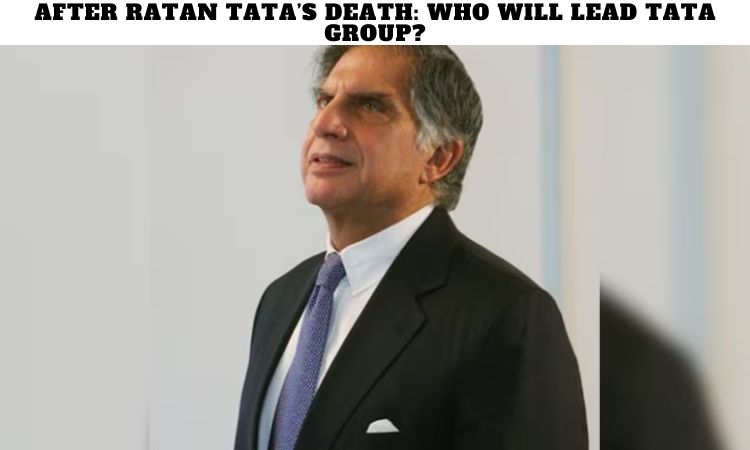
The Tata Group, a powerhouse of the Indian economy, has been synonymous with Ratan Tata for decades. Under his leadership, Tata Group grew into one of the largest and most respected conglomerates in the world, with diverse businesses ranging from steel to software. But the inevitable question arises: What will happen to the Tata Group after Ratan Tata’s death? Who will own or control this vast business empire?
Tata Group: An Overview
The Tata Group is one of India’s largest and oldest conglomerates, founded in 1868 by Jamsetji Tata. It has grown into a global business behemoth, comprising over 100 companies, spanning industries such as automobiles, telecommunications, hospitality, energy, and consumer goods. Companies like Tata Consultancy Services (TCS), Tata Motors, Tata Steel, and Tata Power are well-known worldwide.
Ratan Tata, who led the group from 1991 to 2012 as the chairman, made substantial contributions to its growth. Today, Tata Group operates in over 100 countries, employing hundreds of thousands of people. The company’s success is not just attributed to its business acumen but also to its commitment to corporate responsibility and philanthropy, which have become the hallmark of the Tata brand.
The Tata Trusts: The Real Powerhouse Behind Tata Group
When we talk about who will own or control Tata Group after Ratan Tata, it’s essential to understand the Tata Trusts. These trusts, including Sir Dorabji Tata Trust and Sir Ratan Tata Trust, collectively hold a majority stake in Tata Sons, the holding company of the Tata Group. The Tata Trusts, through their stake in Tata Sons, effectively control the Tata Group.
Currently, the Tata Trusts hold 66% of the equity capital of Tata Sons. This majority control puts them in the driver’s seat when it comes to making critical decisions regarding the future of Tata Group. Ratan Tata has played a key role in shaping the trusts and remains the chairman of Tata Trusts, continuing his legacy in the group despite retiring as chairman of Tata Sons in 2012.
Who Controls Tata Trusts?
The control and management of the Tata Trusts are crucial in determining the future of Tata Group after Ratan Tata’s death. Currently, Ratan Tata himself chairs the Tata Trusts. However, the trusts are governed by a board of trustees, and Ratan Tata has ensured that there is a structure in place for succession planning. Several names have emerged as potential candidates to take over the chairmanship of Tata Trusts after Ratan Tata.
Cyrus Mistry and the Leadership Controversy
In 2012, Cyrus Mistry succeeded Ratan Tata as the chairman of Tata Sons. This marked the first time in the history of Tata Group that a non-family member was appointed to the role. However, Mistry’s tenure was short-lived, and he was ousted from the position in 2016. His removal led to a significant legal battle, and the aftermath of the Mistry-Tata dispute has raised questions about future leadership transitions within Tata Group.
After Cyrus Mistry’s exit, Natarajan Chandrasekaran was appointed as chairman of Tata Sons in 2017. Chandrasekaran, the former CEO of TCS, has since stabilized the group, steering it towards growth and innovation. While he holds significant influence, the chairmanship of Tata Trusts remains the key factor in determining the future of Tata Group’s leadership.
Succession Planning in Tata Group
Ratan Tata has been instrumental in ensuring a well-structured succession plan for both Tata Sons and Tata Trusts. However, given his central role, the question of who will fill his shoes remains a topic of much speculation. The next leader of the Tata Group will need not only to manage the conglomerate’s vast business empire but also uphold its legacy of philanthropy and ethical business practices.
Key Figures in Tata Group’s Leadership Post-Ratan Tata
While Ratan Tata has not publicly named a successor, several names have been floated as potential candidates to take over the reins of Tata Trusts and, by extension, play a crucial role in guiding Tata Sons.
Noel Tata: Ratan Tata’s half-brother, Noel Tata, has often been viewed as a possible successor. He is the chairman of Tata International and plays an influential role in the group. His low-key, strategic approach to business has made him a serious contender to take over the Tata Trusts leadership.
Natarajan Chandrasekaran: As the current chairman of Tata Sons, Chandrasekaran has already proven himself capable of leading the conglomerate through turbulent times. His tenure has seen Tata Group continue to expand globally and strengthen its core businesses.
Venkataramanan (Venkat): Venkat has served as the managing trustee of Tata Trusts, working closely with Ratan Tata. His deep involvement with the trusts makes him a possible candidate to assume more responsibility after Ratan Tata’s passing.
Ownership of Tata Group After Ratan Tata
Given the structure of Tata Sons and the Tata Trusts, the ownership and control of the Tata Group will not change drastically after Ratan Tata’s death. The Tata Trusts will continue to hold the majority stake in Tata Sons, ensuring that the group remains under its control. The real question is who will take over the leadership of the Tata Trusts and guide the future of Tata Group.
The ethos and values of the Tata Group, particularly its focus on corporate responsibility and ethical governance, are deeply embedded in the company’s DNA. Whoever takes over from Ratan Tata will need to maintain these principles while also navigating the complexities of global business in the 21st century.
The Role of Philanthropy in Tata Group’s Future
One of the distinguishing features of the Tata Group is its commitment to philanthropy. The Tata Trusts allocate a significant portion of their earnings to social causes, such as education, healthcare, and rural development. This commitment to giving back to society is a core part of Tata’s identity and will likely remain so even after Ratan Tata’s passing.
The new leadership, whether it’s Noel Tata, Chandrasekaran, or another figure, will need to balance the group’s business interests with its philanthropic endeavors. This balance has been critical to the Tata Group’s reputation as a responsible and ethical corporation, and any shift in this balance could impact the group’s legacy.
Challenges Ahead for the New Leadership
While Tata Group is a robust and diversified business empire, the new leadership will face several challenges. Global competition, rapid technological change, and evolving consumer preferences will require innovative strategies. Moreover, the group’s philanthropic commitments will need to be aligned with the new business realities of the post-Ratan Tata era.
One of the biggest challenges will be managing the expectations of the various stakeholders – from the employees to the shareholders and the public, who see the Tata Group as a national icon. Ensuring that the group continues to grow while maintaining its ethical standards will be key to preserving its legacy.
Conclusion: A Legacy That Will Continue
Ratan Tata has built a legacy that extends beyond business; he has crafted a company that stands for ethics, philanthropy, and innovation. His passing will undoubtedly mark the end of an era, but the structures he has put in place, particularly the Tata Trusts, will ensure that the Tata Group remains a leader in the business world.
Whoever takes over the leadership of the Tata Trusts will play a crucial role in shaping the future of the Tata Group, but they will also inherit a legacy of responsibility, both to shareholders and to society. The Tata Group, with its rich history and strong foundations, is well-positioned to thrive even after Ratan Tata’s passing.


